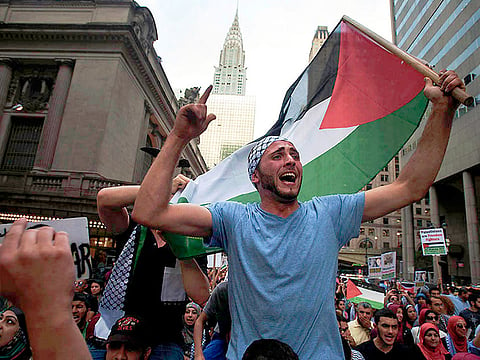The illusive notion of the Arab nation
While many countries, especially in the Gulf region, have moved on, meeting the challenges of modernity, the rest of the Arab world remains immobilised

Whenever the Arab League holds a summit, as it did in Dhahran, Saudi Arabia, on April 15, those of us engaged in writing commentary find themselves pressed to use whatever modest knowledge they possess of political economy, history and culture to muse meditatively, as it were, on the state of the Arab states, to step back from it in exactly the sense in which one steps back from a painting on a wall in order to perceive it better.
The date this last Arab summit was held carries great personal significance for this columnist. It was exactly 60 years before, on April 15, 1958, that as a teenager I left the Arab world to study and eventually live in the West — in Britain, Australia, France and then the United States. The West at the time had an engaging Orientalist innocence about it, and none of the populist grotesqueries that pervade its societies today.
It was, to be sure, a comfortable exile, or ‘ghourba’, as diaspora Palestinians then called life outside their homeland. Throughout it all, however, I remained, root and branch, a Palestinian, an Arab and a Muslim, which are three equivalent centres of my identity. You cannot, after all, fight the power of the archetype, readily embrace your role as the ‘other’ and melt into the pot. If you did so in that kind of misshapen world, the mirror would always have been cracked and the image blurred. But this is not a column about the western world and an Arab’s exile in it — though we know only too well that is a subject worthy of one — but a column about the Arab world and one of its native sons’ reflections on it, from the outside in.
You no doubt recall those depressing reports (and how else would you have described them?) known as the United Nations Human Development Reports, first released beginning in 2002 and composed by a team of distinguished Arab intellectuals, which calmly but bluntly warned that Arab societies were being held back by a lack of political freedom, isolation from the world of ideas (whose end result was to stifle creativity), suppression of women’s rights, the shrinking of productivity, a woeful education system, the flight of intellectuals from their repressive environments (whose own end result was a costly brain drain on the resources of the societies they fled), and the rest of it.
While many countries, specially in the Gulf region, have moved on since, meeting the challenges of modernity on virtually every level, the rest of the Arab world remains immobilised, indeed in places it has regressed.
Why? Set aside the one-off situation in Palestine, where human development under Israeli occupation is all but impossible, and ask why the hope of generations of Arabs for progress — particularly my own in the 1950s, who had struggled not only for social justice and freedom, but for that illusive dream of uniting Arab people by one ideology within a single territorial homeland called the ‘Arab nation’ — has faded?
I submit a simple answer to that question: The stifling of freedom of expression. You see, without that freedom, there is no intellectual inquisitiveness, and without that, there is no opening for people to escape the treadmill of immemorially posited norms, no way to thrust themselves beyond their fixed meaning. You silence, incarcerate or torture to death a citizen because you disapprove of his or her views and you shut down the marketplace of ideas. In effect, you cripple, in a trickle-down effect, every subsystem in the social system. You cripple the life of the mind at its core.
Hounding into extinction
Why then would creative Arabs not seek exile rather than remain in a society that is, at best, callously dismissive of their intellectual effusions and, at worst, is ready to hound them to extinction? Yet, many of these folks who have “remained there”, in the land where they had made their original leap to national and cultural consciousness, and refuse to leave or stop creating, nevertheless ask themselves, from one day to the next, the same mournful questions: And what has been the point, really, of a lifetime of writing, of stringing words together to make them say something meaningful? Why do we have to write, to contend for literacy, to impart ideas, if our work has not once acted as an impediment to oppression, to the degradation of our individual souls? Does our society consider it all of marginal value or, worse, of subversive intent?
As for those of us Arabs, Palestinian Arabs like myself, well, I go home every night, in my comfortable exile in Washington, in an upper middle class neighbourhood, and I feel the weight — still, after all these years — of our collective grief about that place called ‘home’, a grief that has got so heavy in my generation’s twilight years. And I derive implications at once rich and violent from the mere mention of the world. Yes, I go home every night, but there, where I live today, I know that a sense of at-homeness will continue to elude me. Even after 60 years.
Fawaz Turki is a journalist, lecturer and author based in Washington. He is the author of The Disinherited: Journal of a Palestinian Exile.
Sign up for the Daily Briefing
Get the latest news and updates straight to your inbox


